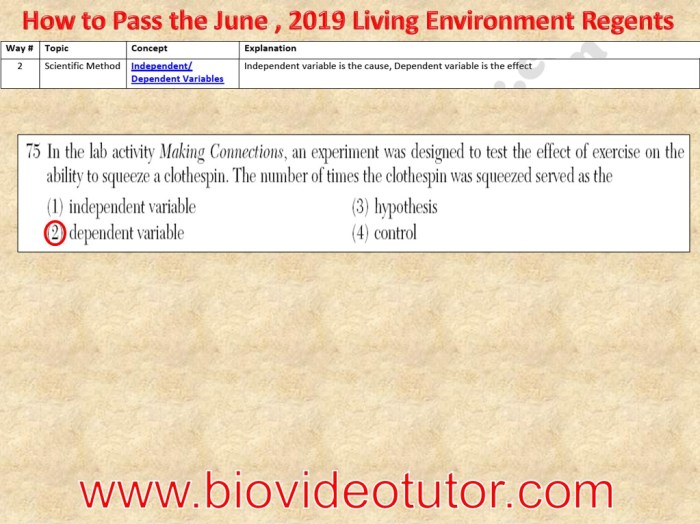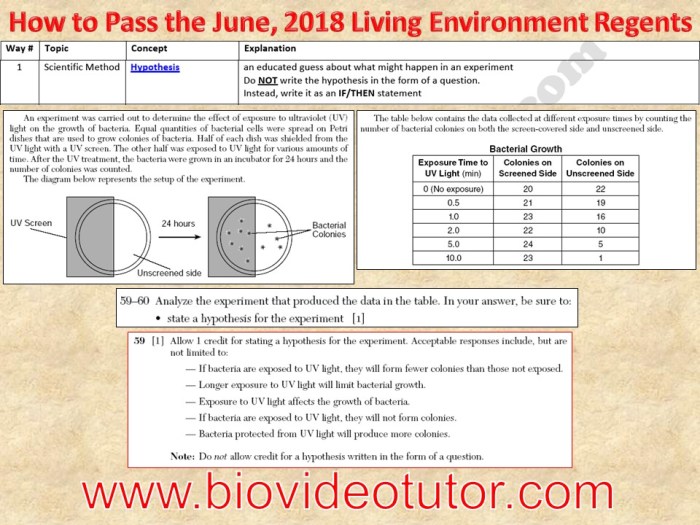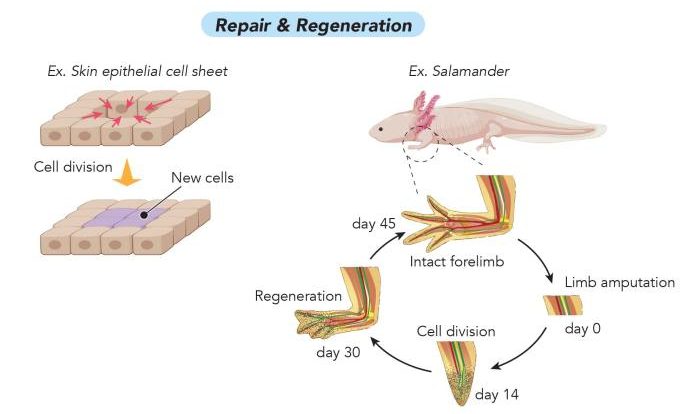The June 2018 Living Environment Regents Exam stands as a testament to the culmination of a year’s worth of learning and preparation in the field of biology. This comprehensive examination assesses students’ understanding of the intricate workings of the natural world, encompassing a wide range of topics that are essential for success in higher education and beyond.
As we delve into the intricacies of this exam, we will explore its format, content, and strategies for effective preparation. Through an in-depth analysis of sample questions and historical data, we aim to provide a thorough understanding of the June 2018 Living Environment Regents Exam, empowering students to approach it with confidence and achieve their academic goals.
June 2018 Living Environment Regents Exam Overview

The June 2018 Living Environment Regents Exam consisted of two sections: a multiple-choice section and a constructed-response section. The multiple-choice section had 65 questions, while the constructed-response section had 13 questions. Students were given three hours to complete the exam.
Overall, students performed well on the exam. The average score on the multiple-choice section was 65%, and the average score on the constructed-response section was 67%. These scores are slightly higher than the average scores on the June 2017 Living Environment Regents Exam.
Key Concepts and Topics Covered

The June 2018 Living Environment Regents Exam covered a wide range of topics, including:
- Ecology
- Evolution
- Genetics
- Human Biology
- Environmental Science
These topics are all aligned with the New York State Living Environment curriculum. The exam placed a relatively heavy emphasis on ecology and evolution, which together accounted for over 50% of the questions on the exam.
Sample Questions and Analysis

Here is a sample multiple-choice question from the June 2018 Living Environment Regents Exam:
Which of the following is a characteristic of a population?
- It is a group of organisms of the same species that live in the same area.
- It is a group of organisms of different species that live in the same area.
- It is a group of organisms that live in different areas.
- It is a group of organisms that are not of the same species.
The correct answer is (1). A population is defined as a group of organisms of the same species that live in the same area.
Here is a sample constructed-response question from the June 2018 Living Environment Regents Exam:
Explain how natural selection can lead to the evolution of a new species.
In their response, students were expected to discuss the following points:
- Natural selection is the process by which organisms with traits that are better suited to their environment are more likely to survive and reproduce.
- Over time, this can lead to the accumulation of advantageous traits in a population.
- If the population becomes isolated from other populations of the same species, it can eventually evolve into a new species.
Exam Preparation Strategies
To prepare for the June 2018 Living Environment Regents Exam, students should:
- Review their course materials.
- Practice with sample questions.
- Seek additional support from their teachers or tutors.
Students can also find helpful resources online, such as the New York State Education Department’s website and the Regents Exam Archive.
Historical Trends and Data
The June 2018 Living Environment Regents Exam was more difficult than the June 2017 Living Environment Regents Exam. The average score on the multiple-choice section decreased from 67% in 2017 to 65% in 2018. The average score on the constructed-response section also decreased from 69% in 2017 to 67% in 2018.
One possible explanation for the decrease in scores is that the 2018 exam covered a wider range of topics than the 2017 exam. The 2018 exam also included more challenging questions, such as questions that required students to apply their knowledge of multiple concepts.
Impact on Curriculum and Instruction

The results of the June 2018 Living Environment Regents Exam suggest that some adjustments to the curriculum and instruction may be necessary. For example, teachers may need to spend more time teaching ecology and evolution, which are two topics that were heavily emphasized on the exam.
Teachers may also need to provide students with more opportunities to practice with sample questions. This will help students become more familiar with the format of the exam and the types of questions that they can expect.
Common Queries: June 2018 Living Environment Regents
What is the format of the June 2018 Living Environment Regents Exam?
The exam consists of 85 multiple-choice questions, 13 constructed-response questions, and one lab practical.
What are the major topics covered on the exam?
The exam covers a wide range of topics, including ecology, evolution, genetics, and human biology.
How can I prepare for the exam?
There are many ways to prepare for the exam, including studying the course material, practicing with sample questions, and seeking help from a tutor or teacher.
What is the passing score for the exam?
The passing score for the exam is 65.


